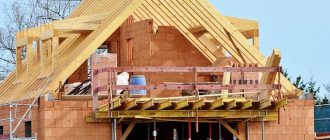The agreement of shared participation in construction is regulated by Federal Law No. 214-FZ “On participation in shared construction of apartment buildings and other real estate and on amendments to certain legislative acts of the Russian Federation”, adopted at the end of 2004. And as experts note, this acquisition procedure apartments are considered the most protected from all kinds of fraudulent schemes. Shareholders invest money with confidence that the developer will act within the framework of the law, which means that actively started construction will not turn into long-term long-term construction. However, as practice shows, not many construction companies are able to provide reliable protection for citizens’ investments.
A little background
Not so long ago, literally just over 10 years ago, on the Russian construction market it was possible to purchase real estate in a house under construction on the basis of a regular shared construction agreement developed by the developer himself with maximum protection of his own interests. At the same time, the rights of the shareholder in shared construction remained rather illusory, giving a huge reason for concern until the moment of receiving the keys to the treasured square meters. The Government of the Russian Federation stood up to protect the rights of shareholders by adopting Federal Law No. 214 “On participation in shared construction of apartment buildings and other real estate and on amendments to certain legislative acts of the Russian Federation,” which came into force in 2005. However, the requirements are too high and the obligations imposed on developers in accordance with the adopted law have led to the fact that many construction companies have switched to selling objects under a preliminary purchase and sale agreement, as well as on the basis of the creation of housing construction cooperatives (housing and communal services) - everything is legal, and the liability is significant less. Discussions regarding Federal Law 214 continued for several years, and various amendments and changes were made to the law in accordance with constructive proposals proposed by developers. This had a positive effect - today the Federal Law provides for more flexible conditions for the implementation of construction projects, while maintaining high liability for violation of the law. Undoubtedly, the new version of the law has also provided its advantages for participants in shared construction - their interests are now under reliable legal protection. And most citizens are even ready to incur any additional expenses, but they purchase an apartment only under a DDU agreement on the basis of 214-FZ.
Shared construction: an expert from the Ministry of Construction and Architecture answers questions
On March 13, 2019, the main provisions of Decree No. 473 “On shared-equity construction” (hereinafter referred to as Decree No. 473) came into force. To implement it, the Council of Ministers adopted a number of resolutions. Zoya Aleksandrovna Shleg, deputy head of the department of regulatory support for the construction industry of the Ministry of Construction and Architecture, answers questions about shared construction.
Are there regulatory requirements for the procedure for accepting applications for concluding shared construction agreements and registering them (electronic queue, “live” queue, pre-registration, using coupons, etc.)? Should the developer approve this procedure with his own legal regulations or is a project declaration sufficient?
The developer is obliged, no later than seven calendar days before the start of concluding contracts, to publish a project declaration with information about himself, the construction project, the procedure for accepting and registering applications for concluding contracts in at least one state printed publication <*>.
Consequently, the developer can begin accepting applications on the eighth day (minimum period) after posting the project declaration. Applications may be accepted at a later date. However, such information for each specific object must be contained in the project declaration .
Information on the procedure for accepting and registering applications must contain the start date and time of accepting applications, including the method of acceptance (in person, by telephone, receipt of an application electronically, etc.).
The need to develop a local act is determined by the developer.
How is a shared construction project transferred from the developer to the shareholder? Does a shareholder have the right to refuse to sign the acceptance certificate for a shared construction project, citing the fact that the shared construction project was built with poor quality? What should the developer do in this case?
The procedure for acceptance and transfer of a shared construction project from the developer to the shareholder is specified in the agreement <*>. This is an essential condition of the contract. Its procedure is specified in clause 15 of the Regulations on the procedure for concluding, executing and terminating contracts for the creation of shared construction projects, conditions for raising funds when carrying out shared construction and clause 3 of the standard agreement, approved. Resolution of the Council of Ministers dated March 12, 2019 N 156 (hereinafter referred to as Resolution N 156).
Subject to full payment of the contract price (price of the shared construction project), the developer, within two days from the date of the shareholder’s application, is obliged to transfer to him the documents necessary for state registration of the shareholder’s rights to the shared construction project. In this case, the developer must make the final payment for the shareholder within no more than 25 calendar days after the construction project is accepted into operation.
The shareholder registers his rights to the shared construction project no later than three months after receiving the necessary documents.
After registering the right to a shared construction project, the developer is obliged to transfer to the shareholder an object whose quality complies with the terms of the contract, technical regulations, design and other documentation and other mandatory requirements, according to the acceptance certificate for the shared construction project, signed by the parties.
The acceptance certificate is signed by the shareholder when transferring documents for the installed equipment and keys to him.
The form of the acceptance and transfer certificate is established by Resolution No. 156. If there are comments on the quality of the object, a list of the shareholder’s comments on the condition of the shared construction object upon its acceptance and transfer is compiled, and the deadline for the developer to eliminate the comments is indicated. This list is also signed by both parties.
From the moment the parties sign the acceptance certificate, the developer’s obligation to transfer the object to the shareholder and the shareholder’s obligation to accept the object are considered fulfilled, the shareholder begins to use this object and bears all costs for its further operation and the risk of accidental death.
Thus, the legislation provides for the signing of an acceptance and transfer certificate for the object, including in the case of deficiencies, with the simultaneous preparation of a list of comments.
The shareholder entered into a shared construction agreement in December 2021 at a certain price per square meter. In February 2018, he terminated the contract. The developer organization calculates the indexation. When concluding the next contract for this apartment, the calculated indexation falls on the new shareholder. Is this legal? How is the indexation amount reflected in a shared construction agreement?
The return of funds to the shareholder in the event of termination of the agreement for the creation of a shared construction project or refusal of one of the parties to fulfill such an agreement is regulated by the Regulations on the procedure for the return of funds upon termination of participation in shared construction, termination of membership in the organization of developers, termination of contracts for the purchase and sale of residential premises built according to government order, approved. Resolution of the Council of Ministers dated 01/08/2014 No. 6 (hereinafter referred to as Regulation No. 6).
The refunded amount of funds is subject to recalculation in the manner prescribed by Regulation No. 6.
Recalculation of the deposited amounts of funds is carried out using the refinancing rate (rates) of the National Bank, effective from the date of deposit of funds by the shareholder until the date of their return, taking into account the time of making payments and the amount of refinancing rates in effect at the time of depositing funds.
The legislation does not provide for the possibility of establishing a different procedure for the return of funds by contract.
If the recalculation and return of funds is refused or the shareholder disagrees with the amount of the refunded amount and the timing of its return, as well as in other cases, disputes are resolved in the manner prescribed by law. As a rule, in court <*>.
The contribution of the new shareholder should not be less than the amount of funds of the retired shareholder, taking into account indexation, which takes into account the change in the contract price (price of the shared construction object) in the event of a change in the forecast price indices for the period of construction of the shared construction object by the retired shareholder.
The form of the standard agreement does not provide a special column for indicating the indexation amount; however, in the section “price of the object (price of shared construction)” it seems appropriate to indicate the amount of funds required to index the contribution of the retiring shareholder.
Next, the expert from the Ministry of Construction and Architecture will tell you whether the developer must eliminate defects in the apartment he built, if they are not hidden, and what is the procedure for selling premises during shared construction of administrative buildings.
Federal Law No. 214: learning our rights
An equity participation agreement (EPA), in accordance with the Federal Law on Shared Construction, is an official document that carries in its contents the rights and obligations of the developer and the participant equally. Accordingly, the developer is responsible for the timely commissioning of the property and its transfer to the participant in shared construction, and the latter, in turn, undertakes to accept the property and make payment in accordance with the established tariffs.
Important! An agreement on shared participation in construction is concluded in writing with mandatory registration with the Federal Registration Service.
The contents of the DDU agreement under 214-FZ must include:
- information about the shared construction project (location address, design documentation);
- the deadline for the developer to transfer the object to the participant in shared construction;
- information on making payment for a shared construction project (amount, terms and payment procedure);
- warranty period for the operation of a shared construction project;
- ways to ensure the fulfillment of the developer's obligations.
In the absence of at least one of the above points, the contract for shared participation in construction is considered not concluded.
At the same time, we note that Federal Law 214-FZ also provides for the occurrence of certain circumstances. For example:
- in the event of the death of a participant in shared construction, his rights and obligations in accordance with the DDU pass to his heirs;
- in the event of damage or destruction of a shared construction project before its transfer to the shareholder, responsibility for all risks rests with the developer;
- in the case of construction of an object by the shareholder for personal needs, that is, in no way related to the implementation of business activities, the contractual relationship between the developer and the shareholder is also regulated by the Law on the Protection of Consumer Rights.
What changes came into force in 2021?
In the summer of 2021, Federal Law No. 153-FZ was adopted, according to which insurance companies were required to transfer premiums for DDU insurance to the Fund. In the future, these funds were to be used to transfer compensation to victims of dishonest actions of developers.
This law affects only insurance contracts signed from July 30 (date of adoption of the Federal Law) to October 20, 2021 (official registration of the Fund). In relation to contracts concluded earlier, the provisions of Law No. 214-FZ apply. Most of the general DDU insurance contracts were signed before July 30, 2017.
For this reason, today shareholders have the right to receive insurance compensation, and it will far exceed the compensation payments provided by the Fund.
The presence of “old” DDU insurance allows the shareholder to refuse to participate in protracted construction at any time, so as not to waste time waiting for the Fund’s decision.
What kind of compensation can you receive from DDU insurance?
DDU insurance allows you to get:
- the full cost of the contract;
- the difference between the market value of housing at the time of acquisition and the developer being declared bankrupt;
- consumer fine (half the contract price + damage).
In total, these payments can double the original cost of the DDU.
What will a shared construction lawyer protect against?
The main problem with policies is the possible bankruptcy of the insurance organizations that issued them. In recent years, the Central Bank of the Russian Federation has revoked the licenses of many insurers, including those who insured the liability of developers. But even if the insurance company went bankrupt during the conclusion of the DDU, an experienced lawyer will help you choose the right method of legal protection for the return of funds.
Victims receive compensation from the Fund during the bankruptcy process of the developer, for which shareholders must be included in the register of claims of construction participants in accordance with the provisions of Article 13 of Federal Law No. 218-FZ of July 29, 2021 (last amended July 13, 2021).
DDU may contradict law 214-FZ. What to do?
As a rule, developers who have been participants in the construction market for several years now have at their disposal a template for a DDU agreement registered with the Federal Registration Chamber. Based on this sample, the developer concludes all subsequent agreements, without giving the participants a reason to worry (of course, unless the buyer enters into some kind of preliminary DM agreement and is not a participant in the military mortgage program). However, in practice there are often cases where the developer includes additional terms and conditions in the share participation agreement that act in favor of protecting his rights and interests. A competent lawyer can see such subtleties when concluding a DDU, so it is recommended to show it to a qualified specialist before signing the document. If there are any additional conditions that increase the protection of the interests of the developer to the detriment of the interests of the participant in shared construction, the latter has the right to demand that the builder make changes to the DDU agreement. Let us note that registering an equity participation agreement is a rather complicated procedure, and it may well be that the developer may not accept the shareholder’s conditions to change the clauses of the agreement. In this case, there are two options for the outcome of events: either the shareholder accepts the conditions of the developer, or looks for another construction project.
What to choose – completion of construction or compensation?
After the developer is declared bankrupt, participants in shared construction will be able to independently determine at a general meeting what the Fund’s funds will be used for – completion of construction work or compensation payments. Legal support will allow you to competently draw up all the necessary papers and eliminate bureaucratic delays in this matter.
As a rule, completing a house is a more rational option than hassle with compensation for damage and a second attempt to purchase housing in another building under construction. The only exception is when construction work stopped at the foundation pit stage.
The Fund has six months from the moment the developer is declared bankrupt and bankruptcy proceedings are opened to make a decision on paying compensation to victims.
The law allows financing the construction of apartment buildings for which the developers did not pay mandatory contributions to the Shareholders Fund. Construction can also be financed:
- transport infrastructure;
- engineering networks and communications.
Citizens participating in construction have the right to demand compensation even if the Fund decides to finance the completion of the problematic facility. This issue is resolved at a general meeting of shareholders as part of bankruptcy proceedings. The bankruptcy trustee is responsible for organizing the general meeting.
Agreement on shared participation in construction under the “gray scheme”
In accordance with Federal Law 214-FZ, the sale of housing under construction other than under an equity participation agreement is not permitted. However, in order to attract money for the construction of real estate, the law allows the creation of housing construction and housing savings cooperatives, as well as, after putting the house into operation, the sale of apartments under a standard purchase and sale agreement. If a developer offers a potential participant in shared construction to sign a preliminary DDU, then, most likely, he works according to the so-called “gray scheme”, when there is a desire to attract money from citizens, but there is no opportunity to conclude the main agreement for shared participation (often this is due to a delay in obtaining documentation for the construction of the facility). When signing a preliminary share participation agreement, the shareholder must remember that the PDDU is nothing more than an obligation to conclude a main agreement with the developer in the future. In addition, if the developer asks for payment or part of it under a preliminary agreement, this is already a violation of Law 214-FZ. And if for any reason the matter comes to court proceedings, the shareholder will not be able to demand payment of a penalty from the developer, since this condition applies only to contracts concluded in accordance with 214-FZ.
Our cases
- Recovered: RUB 2,415,243.
How a shareholder received 2.4 million rubles. from “StartSK” on the agreement to terminate the DDU Read more - Recovered: RUB 1,180,500.
The court recovered 537% of the cost of eliminating deficiencies from PIK-Region More details
- Recovered: RUB 21,394,502.
How to get 21 million rubles. upon termination of a contract for an object worth 9 million. Read more
- Recovered: RUB 14,500,000.
As a developer, Mayak paid 14.5 million rubles. for the war he started Read more
- Inclusion in the register of transfer of housing
How we overcame the bankruptcy trustee and joined the register Read more
- Recovered: RUB 2,260,000.
How we squeezed 2,260,000 rubles out of crooked window profiles from the developer LSR Object-M Read more
- Recovered: RUB 1,634,800.
We collected 1.6 million rubles (206%) for deficiencies in the decoration of the apartment according to the DDU from FSK Leader More details
- Investment is not recommended
How we saved the client RUB 14,665,500. investment Read more
- Recovered: RUB 898,735.
The developer "Lotan" paid the shareholder 274% of the market cost of eliminating the defects Read more
- Recovered: RUB 2,200,000.
Collection of 2,200,000 rubles from BM-Stroy for poor quality repairs in an apartment Read more
- Investment is not recommended
How an analysis of a counterparty helped save RUB 3,385,679. More details
- Recovered: RUB 641,094.
We collected more than 215% of the cost of eliminating defects from the Lotan developer More details
All cases









